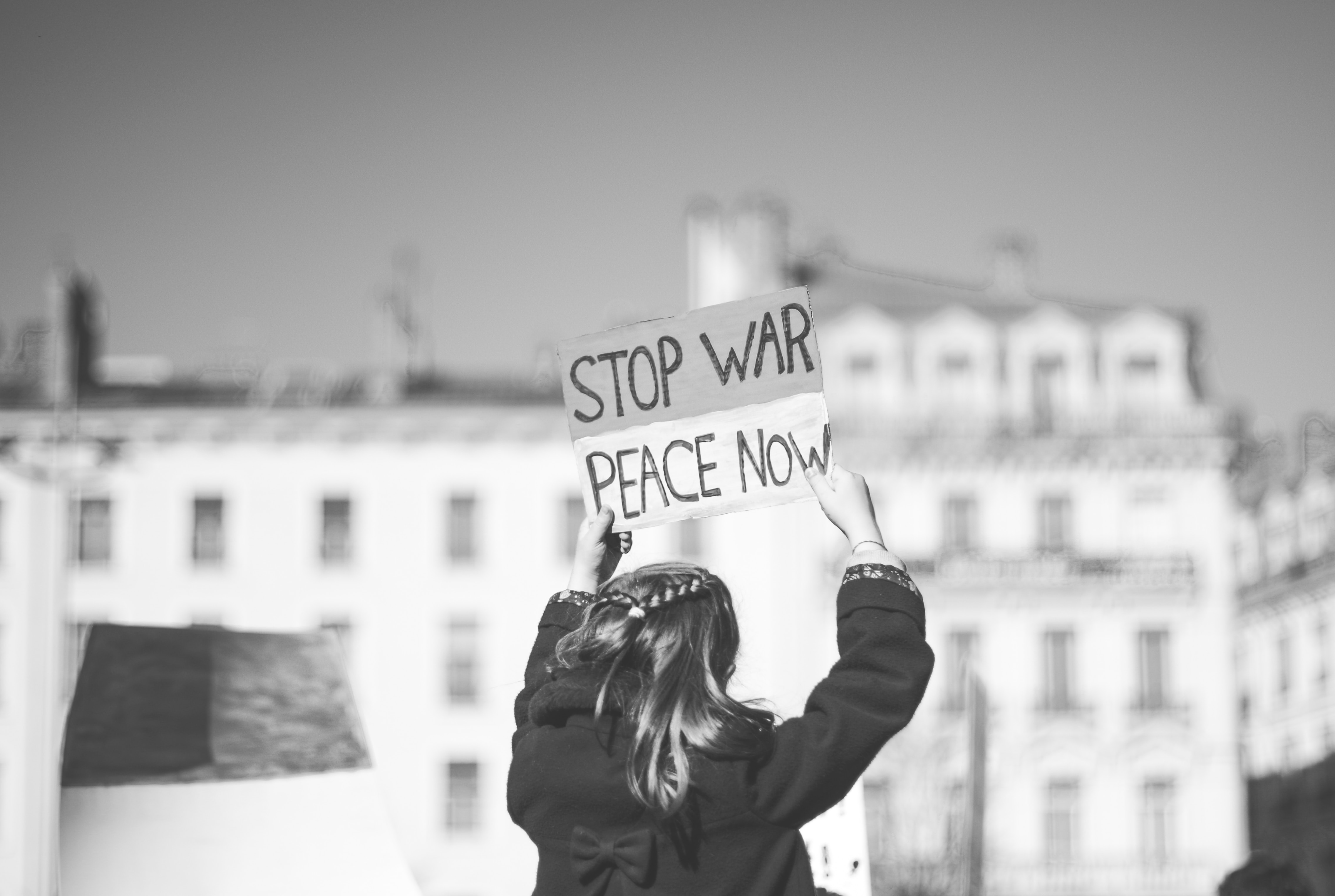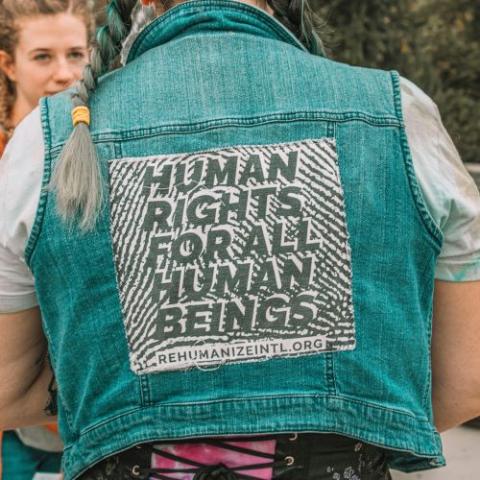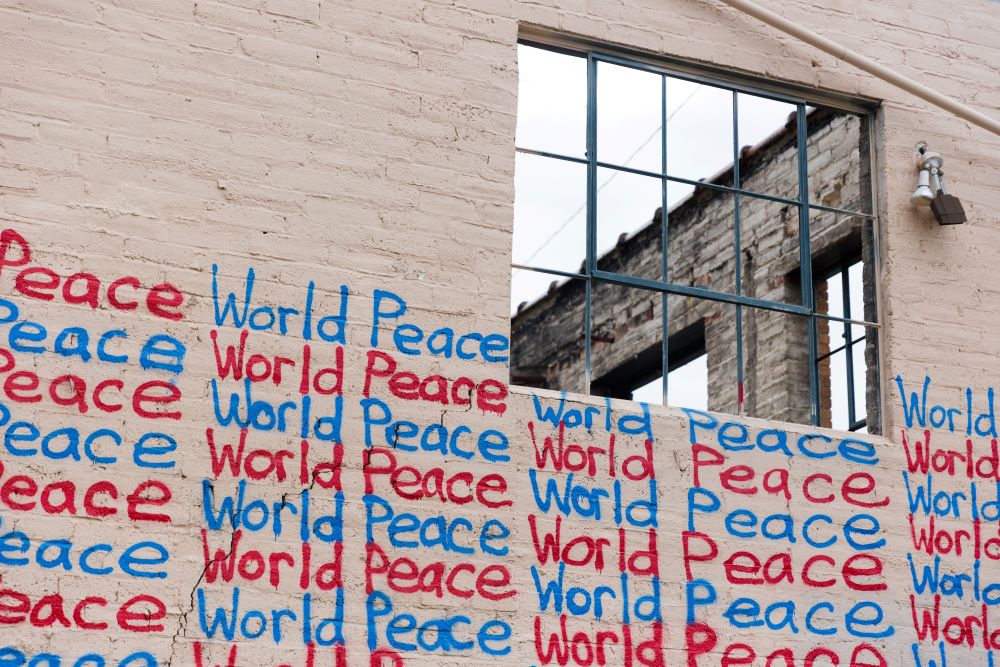
(Unsplash/Ev)
The unspeakable suffering of already deeply traumatized people in Israel and Palestine, and of the Jewish, Christian and Muslim communities around the world whose hearts are with loved ones in the Holy Land, has sickened people of conscience everywhere. Our hearts are breaking as we realize that to Jews this violence feels like a continuation of the Holocaust and to Palestinians it feels like a new Nakba, the "catastrophe" of mass Palestinian displacement and dispossession that began in 1948.
For now, many of us can only be present like Job's three friends: We can only accompany the intense suffering.
When they saw him from a distance, they could hardly recognize him; they began to weep aloud, and they tore their robes and sprinkled dust on their heads. Then they sat on the ground with him for seven days and seven nights. No one said a word to him, because they saw how great his suffering was (Job 2:11-13).
We see how great the current anguish is — and we are terrified as the spiral of violence that seems to have overtaken humanity turns toward regional, even global, catastrophe.
The brutal killing of Israeli civilians by Hamas on Oct. 7 should be — and is being — condemned without question, including by Palestinians. At the same time, the massacre of the civilian population of Gaza, the majority of whom do not support Hamas, should also be — and is being — condemned without question, including by Israelis.
'War always is a defeat ... Stop! Stop!'
—Pope Francis
The situation is heartbreaking and extremely dangerous — for Israelis and Palestinians, for the wider region and for the rule of international law. The killing and hostage-taking, the vicious attacks on civilians, the continuation and tightening of the siege of Gaza that started at least 17 years ago, the increasing violence in the West Bank and the occupation itself illustrate how violence begets violence.
I am convinced that every Palestinian and every Israeli, every Jew, every Muslim, every Christian living in the Holy Land is yearning for genuine security, for dignity, for freedom, for peace — and that strong, courageous, effective nonviolent action is the only path to such a future.
The church calls for a nonviolent way forward
Like many of his predecessors, Pope Francis has consistently rejected war as a fitting tool for building peace, even as he has recognized a people's right to self-defense. In response to the war in the Holy Land he said, "War, any war that there is in the world — I also think of martyred Ukraine — is a defeat. War always is a defeat ... Stop! Stop!" And, with increasing urgency in recent years, he has sought to center on nonviolence in Catholic teaching on war and peace. Our belief in the sacredness of every human life and in the intrinsic value of creation turns us toward nonviolence, as do the word and witness of Jesus Christ.
We are called to support nonviolent steps toward a just peace in the Middle East, even though each one will be extremely difficult, even excruciating.
Last week, as participants of the Synod General Assembly in Rome grappled with the painful global context in which they were meeting, Cardinal Charles Bo, archbishop of Yangon, Myanmar, another tortured country, publicly endorsed Francis' call for active nonviolence to break the cycle of violence and to pave the way for a more just and peaceful future. He said:
The violence and trauma being experienced in this moment by the people of Israel and Palestine — as by the people of Myanmar and by so many others around the world — underscore the critical need for humanity to make a dramatic shift from a global paradigm of war and violence to a paradigm of just peace and nonviolence.
In this spirit, we are called to support nonviolent steps toward a just peace in the Middle East, even though each one will be extremely difficult, even excruciating. This war did not start with the Hamas attacks on Oct. 7 and it will not stop with more rounds of violence. Perhaps these latest horrors will convince the world that a concerted effort to address root causes toward a comprehensive just peace — through structural, political, humanitarian, economic, spiritual and restorative justice approaches — is needed, not more weapons and military aid.

(Unsplash/Maria Oswalt)
Courageous Palestinians, Israelis and their allies have already been building peace in the Holy Land with nonviolent tools — tools that could possibly lead toward the common dream of just peace and deep, lasting security. Numerous nonviolent campaigns led by Palestinians since the late 1980s have resisted the occupation and sought a way forward toward peace, while a movement in Israel, led in part by former Israeli soldiers, has long been calling for a nonviolent solution to this decadeslong conflict.
Eight months ago in Israel and Palestine, a Pax Christi International delegation, trying to understand the increasing tension and already growing conflict, saw recently demolished Palestinian houses and heard many stories of people trying to hold on to their homes and their land, but the people stay, planting their gardens and telling their stories. They call their steadfastness sumud, a powerful expression of nonviolent resistance. On the West Bank, brave Israelis who oppose the occupation have joined others to provide a protective presence in Bedouin villages, while international allies have been accompanying children to school in Hebron, communities facing demolition in East Jerusalem and struggles over land and water in the Jordan Valley.
The obstacles they repeatedly meet are formidable: trauma, fear, dehumanization, violence, corruption, and all the physical and psychological violence of the occupation. Even major nonviolent efforts to end the occupation without the kind of violence now engulfing the Holy Land could not overcome repression by the Israeli government or international bias. One important example was the Great March of Return, weekly demonstrations in Gaza from March 2018 until December 2019 to end the blockade and to advocate for the right of return for Palestinian refugees.

(Unsplash/Tori Nefores)
The nonviolent steps that must be taken are significantly more difficult and more necessary because the unrelenting violence has, until now, led to a dead end, literally. But these nonviolent measures and more are part of a just peace/peacebuilding toolbox and are possible with enough political will in the region and internationally.
A nonviolent process toward peace
Rooted in a deep belief in the dignity of every person and of our common home, a nonviolent process toward just peace would begin with the recognition that all Israelis and all Palestinians have a right to live with dignity in peace and freedom.
Specific steps would include multidimensional diplomacy to negotiate, for example, a humanitarian cease-fire that leads to a permanent cease-fire; access in Gaza to food, water, electricity, internet and essential services; release of the hostages held by Hamas; release of the political prisoners held by Israel; and an end to the blockade of Gaza, including for example, freedom of movement, reopening the airport and access to international trade.
Protection and accountability would also be critical: inviting unarmed civilian protection units (local if possible) and impartial international observers into Gaza, the West Bank, East Jerusalem and beyond as needed; arresting Hamas leaders and perpetrators of the violence on Oct. 7 and bringing them before an international tribunal for crimes against humanity; holding the Israeli government to account internationally for failing to protect civilians in the occupied lands; and arresting and bringing to a just trial Israeli perpetrators of crimes against Palestinians and other Palestinian perpetrators of crimes against Israelis.
Society-wide efforts to address the deep trauma of the Holocaust, the Nakba and the ongoing trauma of occupation could help build understanding of the roots of the conflict, as would creating public spaces for communal grief and to memorialize the loss of lives. A long-term society-wide process of practicing nonviolent communication; widespread investment in nonviolence education and training; sharing of stories, music and art across racial and religious divides; and investment in jobs, sustainable farming, education and health care could go a long way toward healing the divisions.
But creating genuine security for Palestinians and Israelis is the bottom line. Key to this is ending the occupation, a singularly critical nonviolent step which, along with securing clear recognition in the region of Israel's right to exist, could lead toward a viable political agreement and a just peace.
Advertisement
Despite the escalating violence, the cacophony of conflicting opinions, and the apparent hopelessness of the present situation, we humans have the opportunity and moral capacity to opt for the exceedingly difficult but decidedly nonviolent route to justice, peace and reconciliation. Amidst all the opinions and prayers, words and witness of the past few weeks, two quotes caught my attention and filled me with hope.
One is from a Palestinian friend in Bethlehem: "The actions we take today will shape the perceptions and values of future generations. It is our duty to guide them towards a path of peace and coexistence."
The other is from Maoz Inon, the son of two Israeli peace activists, Bilha and Yakovi Inon, who were murdered on Oct. 7: "Let's call for peace. Let's call for hope. Let's call for a complete ceasefire. Let's call for building bridges. ... We must build the future, and this future must be based on equality, on partnership, on peace."







